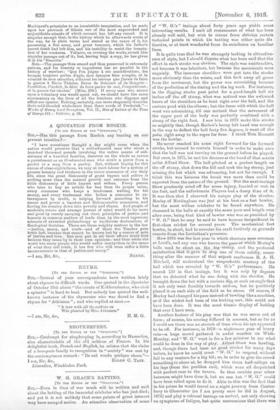A QUOTATION FROM RIISKIN.
[To 71(11 EDITOR Op THE "SPEOTATOli."] Stu,—Has this passage from Ruskin any bearing on our present troubles P—
"I have sometimes thought a day might come when the nation would peroeive that a well-educated man who steals a hundred thousand pounds involving the entire means of sub- sistence of a hundred families, deserves on the whole as severe a punishment as an ill-educated man who steals a purse from a pocket or a mug from a pantry. But, without hoping for this excess of clear-sightedness, we may at least labour for a system of greater honesty end kindness in the minor commerce of our daily life, since the great dishonesty of great buyers and sellers is nothing more than the natural growth and outcome from the little dishonesty of little buyers and sellers. Every person who tries to buy an article for less than its proper value, every consumer who keeps a tradesman waiting for his money, and every tradesman who bribes a consumer to ex- travagance by credit, is helping forward according to his means and power a baseless and dishonourable commerce, and forcing his country down into poverty and shame. And people of moderate means and average powers of mind would do far more real good by merely carrying out stern principles of justice and honesty in common matters of trade than by the most ingenious schemes of extended philanthropy or vociferous declarations of theological doctrine. There are three weighty matters in the law —justice, mercy, and truth—and of these the Teacher puts
truth last. because that cannot be known but by a course of acts of justice and love. But men put in all their efforts truth first because they mean by it their own opinions and thus while the world has many people who would suffer martyrdom in the cause of what they call truth, it has few who will even suffer a little inconvenience in that of justice and mercy."
—I am, Sir, &c., SENEX.
















































 Previous page
Previous page